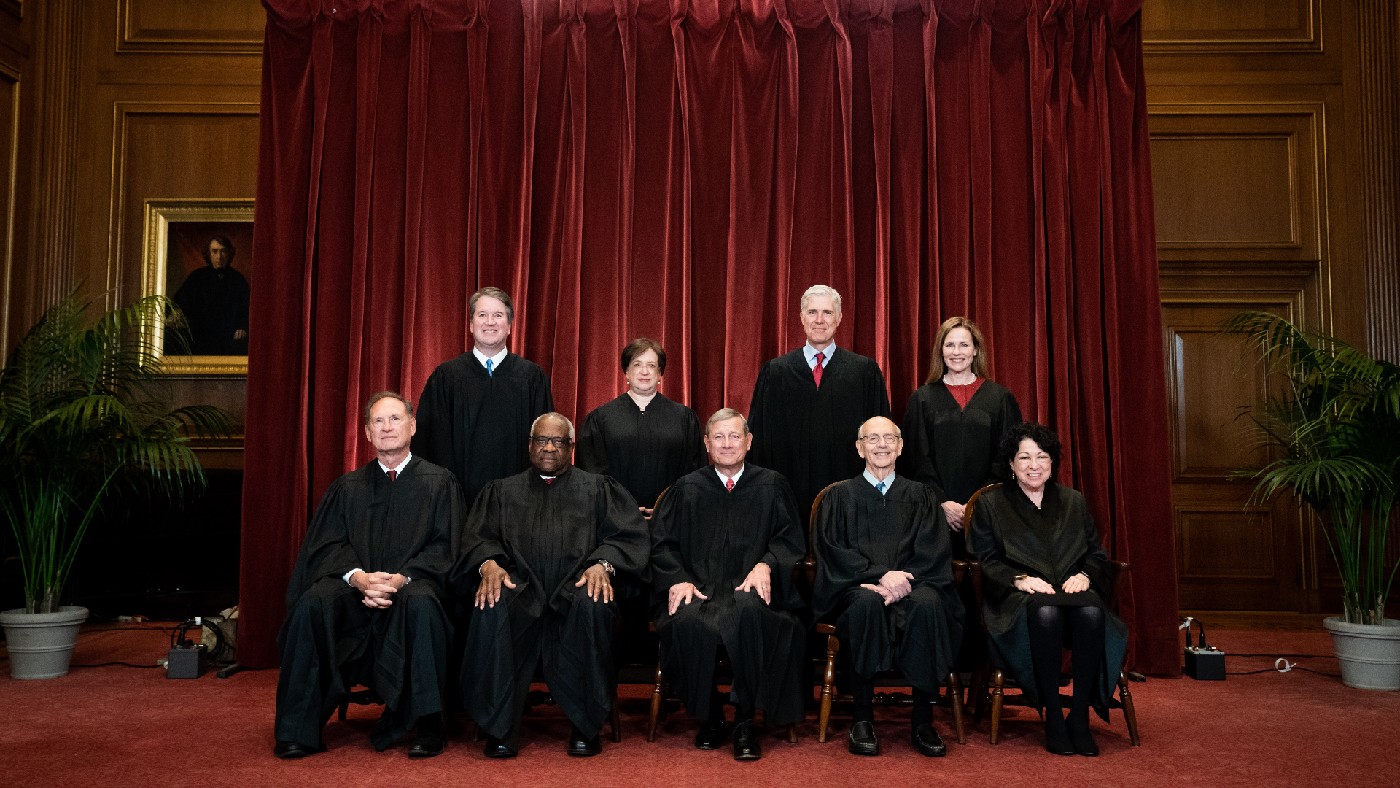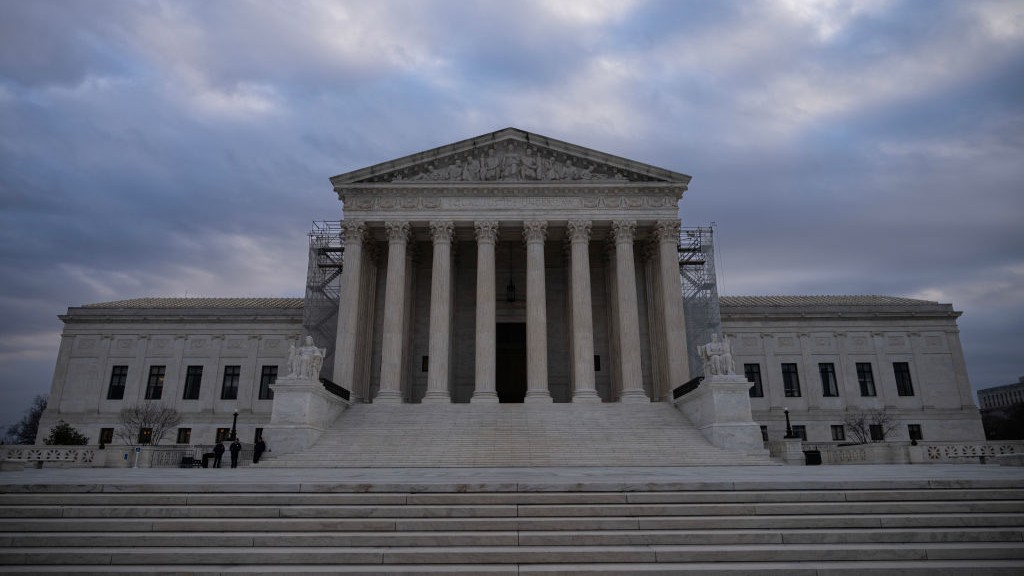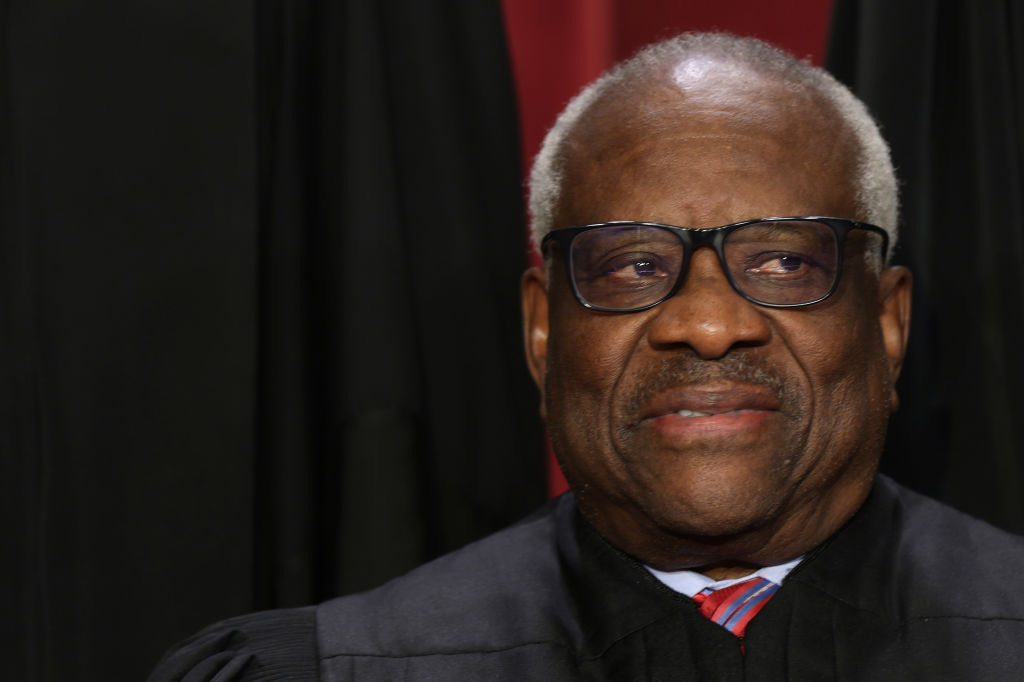‘Far from being a mere everyday annoyance, mansplaining can interfere with democracy’
Your digest of analysis from the British and international press

- 1. Bravo, supreme court: we do need rules to stop men interrupting women
- 2. Universal credit cut could be a ticking time bomb for the Tories
- 3. Is rich people’s bad behaviour worse than that of the less well-off?
- 4. The desire to be as slim as possible in our 20s and 30s is putting women’s bodies at risk after menopause
- 5. Is Hallowe’en racist?
A free daily email with the biggest news stories of the day – and the best features from TheWeek.com
You are now subscribed
Your newsletter sign-up was successful
1. Bravo, supreme court: we do need rules to stop men interrupting women
Eleanor Margolis for The Guardian
on ‘manterrupting’
The US Supreme Court has introduced new rules to address the tendency for men to talk over women, highlighting that “far from being a mere everyday annoyance”, “mansplaining” or “manterrupting” can “interfere with democracy”, writes Eleanor Margolis for The Guardian. Research backs this up. A 2014 George Washington University study found that “when speaking to women, men interrupt 33% more often than when speaking to other men”. Margolis has experienced “mansplaining” first-hand: “There have been several occasions on which men have tried to explain my own articles to me,” she writes. “In fact,” she adds, “if a man doesn’t see this, and then tries to mansplain mansplaining to me, I’ll be genuinely surprised.” Sonia Sotomayor was the most interrupted Supreme Court justice in 2019 hearings. Margolis says of her, “as a woman, you can be a literal supreme court justice and still get shouted down like someone’s little sister”.
The Week
Escape your echo chamber. Get the facts behind the news, plus analysis from multiple perspectives.

Sign up for The Week's Free Newsletters
From our morning news briefing to a weekly Good News Newsletter, get the best of The Week delivered directly to your inbox.
From our morning news briefing to a weekly Good News Newsletter, get the best of The Week delivered directly to your inbox.
2. Universal credit cut could be a ticking time bomb for the Tories
Mhari Aurora for The Times
on the welfare state debate
The UK is “entering a cost of living crisis where household bills are set to rise, the price of supermarket goods increase and a national insurance levy is to be introduced next year”, writes The Times’ Red Box reporter Mhari Aurora. “Could we see a nasty backlash for the Tory party in the months to come?” she asks. Both Iain Duncan Smith and Andy Street, the Conservative mayor of the West Midlands, shared concerns with Aurora about the removal of the £20 Universal Credit uplift. The extra money was brought in to support people on low incomes during the pandemic but ended last week. “Across the house there will always be disagreements about the welfare state, but behind closed doors Conservatives are concerned about a potential backlash,” Aurora adds. Although polling so far suggests that the government hasn’t been too damaged by the cut, “we may see red wall MPs shouting louder as their constituents begin to feel the pinch this winter”, she concludes.
A free daily email with the biggest news stories of the day – and the best features from TheWeek.com
3. Is rich people’s bad behaviour worse than that of the less well-off?
Rhymer Rigby for the Financial Times
on impunity for the wealthy
“From the Presidents Club to the Bullingdon Club, it is not hard to find examples of the rich behaving badly,” writes Rhymer Rigby for the FT. The wealthy certainly don’t have a monopoly on behaving badly (“as anyone who has watched football fans at their worst can tell you”), but “perhaps bad-rich behaviour is different from bad-poor or bad-middle-class behaviour”, he wonders. Experts say that when people become wealthy “they tend to purchase ‘separation and isolation’ (bigger houses, private travel and so on)” which “has the effect of reducing empathy”, Rigby continues. In addition, those further down the pecking order “rely on other people to succeed and survive, which means they must read their emotions” – something which the rich do not need to do as they can “buy” help. “When you only ever mix with other rich people, it is easier to ‘other’ those who are not: you treat them as a homogeneous group, rather than individuals”, he says. And, on top of this, “the rich seem less likely to suffer harsh consequences of bad behaviour” – you only have to do a quick Google search to find “dozens of stories of wealthy people spared substantial sentences for serious crimes, such as causing death by drunk-driving, drug smuggling, violence and rape”.
4. The desire to be as slim as possible in our 20s and 30s is putting women’s bodies at risk after menopause
Poorna Bell for the i news site
on ‘safeguarding against future ailments’
Learning about the “life-changing, positive impact” that strength training has had on columnist Poorna Bell’s cardiovascular health and bone density is one of the reasons why she’ll keep lifting weights “until I physically can’t”. Writing for the i news site, she explains that strength training “can be a powerful prevention tool in safeguarding against future ailments” like osteoporosis. “But thinking about our future selves, and how to ensure we have the best quality of life in decades to come, is not really something that is instilled in us,” she continues. Sadly, because of our “slim-obsessed culture”, people assign moral value to food and body sizes, drowning out the message “that nutrition and physical activity are there to support the health of the body, and are not just tools to attain an aesthetic”. In fact, the pressure that society puts on women to be slim means we “sabotage ourselves”, Bell adds, concluding that “strength training needs promoting among every age group”.
5. Is Hallowe’en racist?
Michael Deacon for The Daily Telegraph
on the tedium of 31 October
Reports that the National Theatre of Scotland wants to ban the word “spooky” on supposedly racist grounds is easy to “scoff at”, writes Michael Deacon in The Daily Telegraph. But, with Halloween less than two weeks away, he “vigorously” encourages anything “to discredit this needless orgy of tedium”. “For parents, Halloween is an unmitigated nuisance,” Deacon continues. From the “chore” of coming up with costumes for your children to the “boredom” of escorting them door-to-door “on a cold autumn night”, the whole affair is “a pain in the neck”. Deacon’s keen for society to draw attention to “other problematic aspects” of the celebration. Perhaps we could persuade the National Theatre of Scotland “that the use of white bedsheets as ghost costumes fails to reflect the true diversity of the spirit community”, he says. Or, even better, we could “discourage trick-or-treating” because it was popularised by the film ET – making trick-or-treaters “guilty of cultural appropriation”.
-
 How the FCC’s ‘equal time’ rule works
How the FCC’s ‘equal time’ rule worksIn the Spotlight The law is at the heart of the Colbert-CBS conflict
-
 What is the endgame in the DHS shutdown?
What is the endgame in the DHS shutdown?Today’s Big Question Democrats want to rein in ICE’s immigration crackdown
-
 ‘Poor time management isn’t just an inconvenience’
‘Poor time management isn’t just an inconvenience’Instant Opinion Opinion, comment and editorials of the day
-
 10 things you need to know today: January 6, 2024
10 things you need to know today: January 6, 2024Daily Briefing Supreme Court to rule on Trump being kept off 2024 presidential ballots, Hezbollah fires rockets toward Israel following Hamas leader’s death, and more
-
 Clarence and Ginni Thomas face new ethics scrutiny over secret payments, gifted private school tuition
Clarence and Ginni Thomas face new ethics scrutiny over secret payments, gifted private school tuitionSpeed Read
-
 Clarence Thomas did not disclose real estate he sold to GOP megadonor Harlan Crow, report details
Clarence Thomas did not disclose real estate he sold to GOP megadonor Harlan Crow, report detailsSpeed Read
-
 Clarence Thomas, under scrutiny for regular lavish trips from GOP donor, stopped reporting gifts in 2004
Clarence Thomas, under scrutiny for regular lavish trips from GOP donor, stopped reporting gifts in 2004Speed Read
-
 Supreme Court to hear arguments on water supply shortages for Navajo Nation
Supreme Court to hear arguments on water supply shortages for Navajo NationSpeed Read
-
 How the Seoul Halloween crowd crush happened
How the Seoul Halloween crowd crush happenedfeature Authorities criticised after at least 154 people killed in stampede in South Korean capital
-
 ‘The UK’s malaise will not end with the Prime Minister’s exit’
‘The UK’s malaise will not end with the Prime Minister’s exit’Instant Opinion Your digest of analysis from the British and international press
-
 ‘Police tactics are not getting worse, they are simply being filmed’
‘Police tactics are not getting worse, they are simply being filmed’Instant Opinion Your digest of analysis from the British and international press